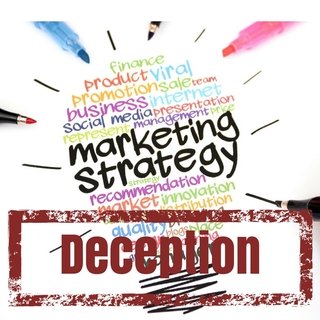Marketing and Manipulation
Years ago before I got into IT, I took a marketing course called NIMA. My goal was to improve my economic skills. The course is quite tough with only a 21% success rate. In the course I learned a lot about marketing, but a lot of the marketing strategies felt like they were more leaning towards deceiving consumers than actually a tool for promoting products. The course opened my eyes toward advertisement and other misleading marketing strategies.

Marketing goals
When we think of marketing, we tend to think of advertisement. A company tries to send a message to consumers about its products of services. If this message is well received than consumers will be more inclined to buy those products or use the services of that company.
The marketing department's goal is to make sure the information about the products or services are up to the companies standards. If the marketing department is doing its job well than this will lead to more sales.
Companies have long ago discovered that marketing, especially advertisement is crucial in selling goods. A good example is in gaming. The release event of a new gaming console can be the deciding factor in becoming market leader or losing potential buyers. Both Sony and Microsoft have experience with losing a console War right out of the gate because their initial message about a newly introduced console was not well received by the gaming community.
Gaming companies are by in my opinion some of the worst at marketing strategies
The grey area
Now comes the dilemma, what if you could boost sales by using strategies that influence your potential buyers? You won't be exactly lying about your product but just making your product more attractive for the consumers.
The best example is McDonald's with their representation of their burgers. Who has ever gotten the exact same burger as depicted in the pictures?

Another prime example is the deception by car companies with fuel efficiency ratings and diesel emission tests. To make a car as desirable as possible for consumers companies knowingly manipulate the results. Even if they are not manipulating the results, they are not exactly telling the whole story. The fuel efficiency tests are done in labs where the cars are made as light as possible and with as little resistance as possible (for example the side view mirrors are removed). The thing is that the circumstances under which the tests are performed are in no way representative for how a consumer in real live would use that car. The result is that the real fuel consumption is always much higher than what the car companies advertised.
It gets even worse
Marketing has turned into large scale manipulation of consumers in every way possible. Marketing firms even uses psychology to gain influence over the decisions made by consumers.
These can be little things like supermarkets placing the goods that will make them the most profit on eye level in the shelves to blatant lies like selling so called fresh orange juice that in reality only contains 25% actually fruit (if you are lucky).
Some of the misleading marketing tactics
Creating false trust
If you don't really trust what a company is spouting about their product, you can always hop on the internet and find reviews right? But what if I tell you that you cannot always trust those. For the most part marketing departments are one step ahead of us. Cherry blossoming is a strategy where people on social media are paid to say positive things about a product. Youtubers are known to been have paid off by companies for positive reviews.False promises
Red Bull gives you wings, well we all know that it doesn't but Red Bull does suggest that the beverage gives you energy. In the case of Red Bull this is most likely true, but what of other products that do the same thing but can't deliver. Kellogg's claimed that eating Rice Krispies could boost your immune system and Mini-Wheats would make you smarter. Both claims turned out to be untrue and lawsuits followed.
The examples of false promises are numerous. Companies claim that using their products will make you cool, wanted by women, smarter, younger looking, healthier, the list goes on and on.
But none of these companies have the scientific evidence to back up their claims. They wrap up their message in a great looking ad campaign and hope that it hits home with the consumers.Forced Continuity aka Vendor lock-in
A well-known strategy in IT. By using proprietary technology companies try to make you depended on their products. For example if have an iPhone you are almost forced to make use of Apple's services. It is hard to mix iOS with services offered by Google. Microsoft, Sony, Cisco are well known for using proprietary technology and forcing consumers and companies to get with their program.Conditioning
The trick here is to repeat something until it becomes true. This works for claims but also for products itself, a brand can become synonymous for a item. In the Netherlands we call blinds "Luxaflex" but Luxaflex is a actually a brand. In the US tissues are called "Kleenex" but again Kleenex is a brand but has become the synonymous for tissues.
The funniest (failed) attempt to use this strategy for me was when I heard the phrase "Let's Bing it" uttered by one of the detectives in the heavily Microsoft sponsored show Hawaii Five-O. This was clearly an attempt to promote the Microsoft search engine Bing and introduce a catchphrase similar to Google's "Google it". The actors kept trying to "Bing it" for a couple of episodes before someone realized that it was not catching on and actually quite silly.

In the end
Marketing strategies are becoming more and more devious. Companies are trying their best to influence the consumers and trick them into buying their products even though they would normally wouldn't do so. Promotion of products has come to a situation where companies flat out lie about information regarding their products.
But in the end you (yes, you the consumer) have the power to decide what en when you are going to purchase a product or make use of a service. Do your own research, check the facts. If what you see is to you liking based on your own findings you will feel better about your purchase.
Also be honest about how you feel about a product after your purchase. In the marketing course I also learned about Cognitive dissonance. It sounds complex but basically means that when a consumer chooses to buy a product (Let's take a gaming console for example). The consumer will try in every way possible to defend that the purchase. In my example an Xbox owner will only pay attention the positive reviews about the Xbox one and ignore the critical ones or the positive reviews about the Playstation (competitor of the Xbox).

Are you sensitive to marketing manipulation strategies, do you feel that companies are taking it too far with their marketing schemes? Let me know in the comment section.

Milestone 300 FollowersIntroducing the Phantom Console
The Internet: Commodity or Necessity?
KontrolFreek Review
Where are they now? Playstation TV



Such techniques are being used from the middle ages up till now..It will never change..We market us everyday to other people our community workplace..It is just a way of getting more than we want..
So you are saying it's just something that comes with capitalism? Do you find it ethical or just the way it is?
it comes with humans..Not just capitalism..And ethics vary from person to person and from time to time..everyone is marketing their stuff or themselves constantly and majority are not even aware of it..Its just the way it is..Better marketer always wins..
Want a boost? Click here to read more!
Want a boost? Click here to read more!
Want a boost? Click here to read more!
I think big pharma are the masters in this space.
i cannot stand to watch network tv anymore, it literally aggravates me to see ads. and to think i grew up with a tv / infosource of 5 channels, which was my gateway to the world... we are indoctrinated into a cultural mindset, of course we are... i'm just glad this new generation has a chance to self-program,,, one can hope